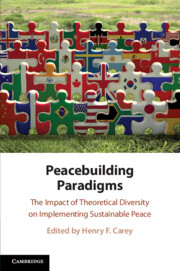Book contents
- Peacebuilding Paradigms
- Peacebuilding Paradigms
- Copyright page
- Contents
- Figures
- Tables
- Contributors
- Foreword
- Introduction Bridging the Conceptual and Theoretical Divides on Peace and Peacebuilding
- Part I The Realist Paradigm
- Part II The Liberal Paradigm
- Part III The Constructivist Paradigm
- 6 The Social Construction of Peacebuilding
- 7 Generations of Constructing Peace
- Part IV The Cosmopolitan Paradigm
- Part V The Critical Theory Paradigm
- Part VI The Locality Paradigm
- Part VII The Policy Paradigm
- Bibliography
- Index
7 - Generations of Constructing Peace
The Constructivism Paradigm and Peacebuilding
from Part III - The Constructivist Paradigm
Published online by Cambridge University Press: 16 December 2020
- Peacebuilding Paradigms
- Peacebuilding Paradigms
- Copyright page
- Contents
- Figures
- Tables
- Contributors
- Foreword
- Introduction Bridging the Conceptual and Theoretical Divides on Peace and Peacebuilding
- Part I The Realist Paradigm
- Part II The Liberal Paradigm
- Part III The Constructivist Paradigm
- 6 The Social Construction of Peacebuilding
- 7 Generations of Constructing Peace
- Part IV The Cosmopolitan Paradigm
- Part V The Critical Theory Paradigm
- Part VI The Locality Paradigm
- Part VII The Policy Paradigm
- Bibliography
- Index
Summary
That constructivism appears to be everywhere and nowhere in thinking about contemporary peacebuilding is a paradox attributable to the nature of constructivism itself.Ultimately, the essential contribution of constructivism to thinking aboutglobal politics and peacebuilding can be distilled to one simple idea: norms matter.Acknowledging there is no coherent constructivist peacebuilding paradigm, our aim in this chapter is to demonstrate the inherently constructivist nature of both the theory and the practice of peacebuilding and how they work iteratively to produce norms and reinforce practice. We examine the core assumptions of constructivism and the theoretical intersections between constructivism and peacebuilding. We then lay out generations of peacebuilding, reflecting on the normative theorizing that shaped them, and related policy and practice, illustrating how they iteratively shaped one another. We emphasize how a greater focus on a multidirectional process of norm contestation provides valuable insights into ways norms evolve and their impact on peacebuilding.We conclude by suggesting how peacebuilders and constructivists can advance the cause of peace.
Keywords
- Type
- Chapter
- Information
- Peacebuilding ParadigmsThe Impact of Theoretical Diversity on Implementing Sustainable Peace, pp. 126 - 144Publisher: Cambridge University PressPrint publication year: 2020
- 5
- Cited by

